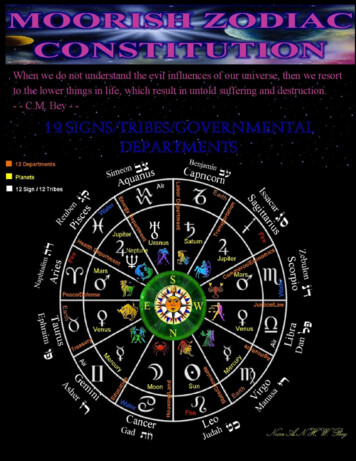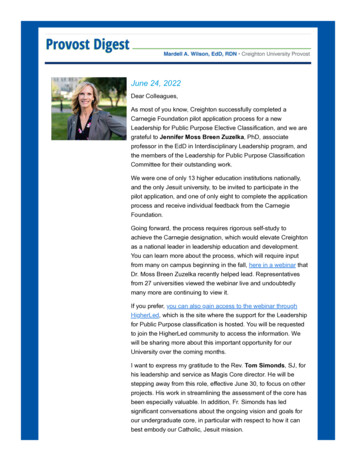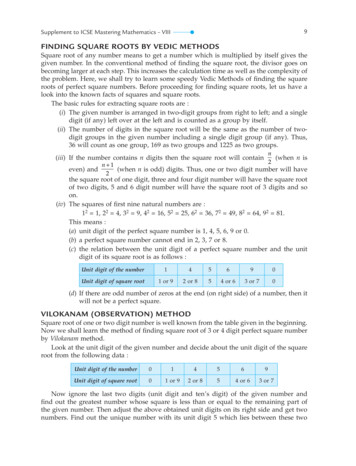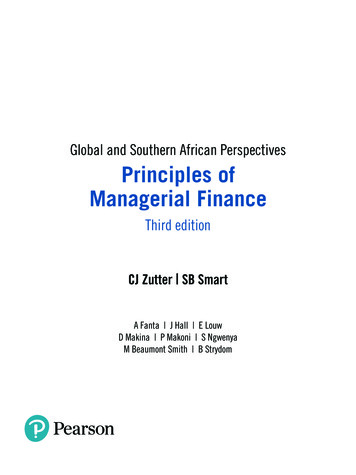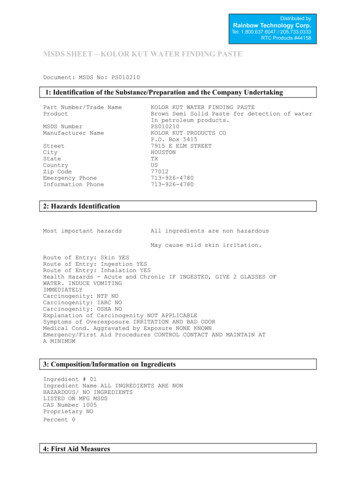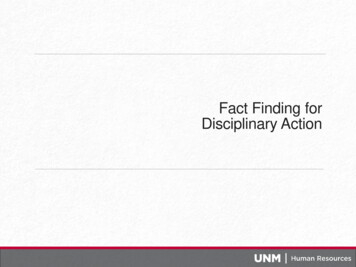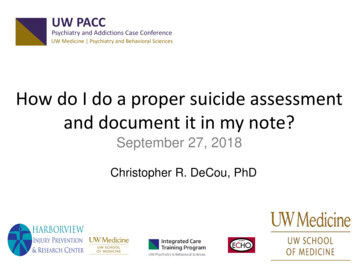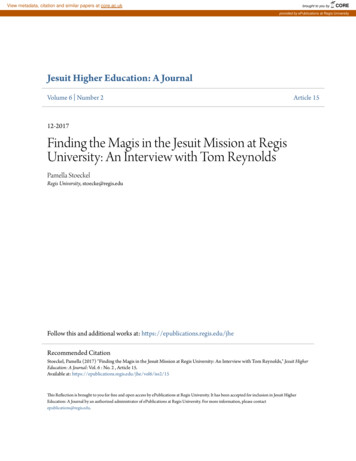
Transcription
View metadata, citation and similar papers at core.ac.ukbrought to you byCOREprovided by ePublications at Regis UniversityJesuit Higher Education: A JournalVolume 6 Number 2Article 1512-2017Finding the Magis in the Jesuit Mission at RegisUniversity: An Interview with Tom ReynoldsPamella StoeckelRegis University, stoecke@regis.eduFollow this and additional works at: https://epublications.regis.edu/jheRecommended CitationStoeckel, Pamella (2017) "Finding the Magis in the Jesuit Mission at Regis University: An Interview with Tom Reynolds," Jesuit HigherEducation: A Journal: Vol. 6 : No. 2 , Article 15.Available at: is Reflection is brought to you for free and open access by ePublications at Regis University. It has been accepted for inclusion in Jesuit HigherEducation: A Journal by an authorized administrator of ePublications at Regis University. For more information, please contactepublications@regis.edu.
Reynolds: Finding the MagisFinding the Magis in the Jesuit Mission at Regis University:An Interview with Tom ReynoldsTom Reynolds began his exemplary service at Regis University in Denver, Colorado in 1987. He served formany years in the role of Vice President for Student Life. In 1998 he took the position of the university’s firstlay mission officer and has served in that capacity until his retirement in May 2017. As a respected andadmired leader, he has promoted living out the Jesuit mission not only by words but by actions. He agreed toshare his thoughts in response to questions about his experiences at Regis University.An interview upon retirement as Vice President for Mission of Regis University with Dr. Pamella Stoeckel,Associate Professor, Loretto Heights School of Nursing, Regis University, pstoecke@regis.eduWhat have been the most significant events inthe thirty years you have been at RegisUniversity?It’s difficult to choose singular events as being themost significant markers of how Regis has evolvedin my years here. If I had to choose one, I wouldpoint to August, 1993, when World Youth Day,the triennial gathering of over half a million youngCatholics from around the world, came to Denverfor a week. Regis was the host for several hundredof these young people, serving as the lead on theprogram. In addition, we hosted a visit of PopeJohn Paul II to our campus as he met withPresident Bill Clinton. Those events galvanizedthe Denver community, gave Regis worldwiderecognition, and inspired our universitycommunity.Perhaps more importantly, and certainly moregradually, I have been continually grateful for oursteady growth into a comprehensive, mission-inspired, and ever better university. When I camein 1987, we were really two colleges; one our longtime undergraduate Arts and Sciences program;the other, a new and growing program forworking adult learners that eventually became theSchool for Professional Studies and later becamethe College for Professional Studies.In 1988, Loretto Heights College in Denverclosed, and they asked Regis to continue some oftheir programs and bring on as many of theirfaculty and staff as possible. The great blessing outof these new members of our community was thattheir nursing program became the Loretto HeightsSchool of Nursing, which has expanded andbecome a successful university program. It hasbecome the genesis for many other healthprofessions schools, like Physical Therapy andPharmacy. With this growth in quality and varietyof academic programs, Regis has truly become aJesuit Higher Education 6(2): 45-48 (2017)45
Reynolds: Finding the Magisuniversity, and a better one for our students andour surrounding community.Similarly, I have great hope for the changes we arestill engaged in through our most recent strategicplanning effort, in which we are renewing ourvision of ourselves and becoming a university offive colleges, each with its own distinctive ways ofeducating students and contributing to our Jesuit,Catholic mission and identity. These gradual andchallenging re-imaginings of who we are provideevidence of a learning community that is still reinventing itself in search of the “greater good”(the Jesuit value of magis). How has your role as Vice President forMission evolved over the years?Many folks at Regis are unaware that I was askedby our former president, Fr. Mike Sheeran, S.J., tochange roles after a number of years here as theVice President for Student Life. Looking back atthat change, I realized that the timing was right forboth me and Regis. I had done some good workin that role, but I needed new challenges; similarly,Regis needed some new energy to build up ourMission programs.Initially, I kept my Student Life role while I beganto slowly develop Mission efforts on a pilot basisuntil I switched to an exclusive focus on Missionwork in 2002. I was really creating a Missionvision and set of activities from scratch duringthose early years, and I spent a lot of time tryingout various ideas and finding out which of them“stuck” and which of them didn’t. Fortunately,this was a new profession at that time. No one atRegis, or almost anyone else in Jesuit highereducation, really knew what we should be doing tobuild up awareness of our Jesuit mission values.So I had the luxury to experiment, fail at times,succeed at times, and gradually build up a set ofefforts that could draw our Regis community intoa deeper commitment to our Jesuit identity.Among the projects that have been grace-filled forme: Our efforts at “hiring for mission” andproviding mission formation experiencesfor our new faculty and staff colleagues; Our collaborative work with other Jesuitschools to develop joint missionprograms such as the Heartland-Deltaconferences and the Ignatian ColleaguesProgram;Helping to involve Regis in great projectsthat serve first generation students andfamilies and give them the possibility of aRegis education, such as the PorterBillups Leadership Academy, ArrupeJesuit High School, and Escuela deGuadalupe;Working with great Mission colleagueslike Ken Phillips, Kristi GonsalvesMcCabe, and Paul Alexander, who havebrought their own creative vision to ourcampus religious art installations, ourChapel, our University Ministry programs,and the Institute on the Common Good;Relationships with other wonderfulfaculty and staff colleagues that allowedus to enrich our core curricula, create newmission-focused courses and departmentslike Health Care Ethics and Peace/JusticeStudies, develop innovative servicelearning programs, and widen ourengagement with the community beyondour campus.Along the way, I have had other opportunities tobe a part of the Regis family, often in ways I hadnever expected. For example, our president, Fr.Fitzgibbons, asked me to chair our strategicplanning efforts soon after he arrived. Then sometime later, he asked me to serve as his chief ofstaff along with my mission duties. In one sense,these were not “mission” duties, but theyreminded me that Mission work is a piece of whateveryone at Regis does, and we all haveopportunities to deepen our commitment to thisshared work, no matter what our job titles ordepartments.On a personal level, I learned that I had to let go abit and invite others to take on new mission rolesas my time was shifted to other duties. In addition,I came to see that the time for new leadership andcreativity in the mission area was now. I had donemy good work and others could take it evenfurther. That’s why I am grateful and hopeful forFr. Kevin Burke’s decision to join our Regis familywith his new Mission team. They will bring a newJesuit Higher Education 6(2): 45-48 (2017)46
Reynolds: Finding the Magissense of energy and insight to our wonderfulJesuit, Catholic identity.What decisions have been particularlychallenging for you during your time atRegis?My general answer would be that virtually alldecisions we make in life carry with themchallenging elements or trade-offs, even those thatinvolve choices between two or more goodoptions. In some ways those are harder thanchoices between good and bad. The Ignatiandiscernment process that Jesuits have shared withtheir colleagues has been helpful for me inconsidering what might be the best direction thatwould lead to the greater good for our communityor an individual (the magis).That said, the hardest decisions are always thosethat involve the lives and careers of students andcolleagues. During my years at Regis, I have hadto tell students that they had to leave Regisbecause of their behaviors or academicperformance, I have had to tell colleagues thatthey would no longer have a job with us, and Ihave had to make changes to departments orprograms that were not always popular. In makingthese decisions, I have tried to balance whatJesuits call care for the person (cura personalis) withcare for the community and its needs (curaapostolica), which is not always a simple choice. Ihave also come to realize that caring for someone,such as a student or colleague, always involvesrespecting their dignity and getting to know theirneeds, treating them with an ethic of care does notnecessarily mean giving them what they want.Often, we need to hold others accountable fortheir actions, or lack of action, so that they cangrow into the people they hope to become. This israrely an easy message to convey and frequently, Isuspect, it was harder on me than on them.In my work a few years back on our “RegisRising” strategic planning process, I came torealize that the three-college model, which hadfunctioned well for us for many years, had notkept up with the changing landscape of highereducation, and further, was no longer serving theneeds of our current students or universitycommunity. Convincing colleagues that changewas needed—never a happy message—wasdifficult. Getting the changes accomplished, andsupporting individuals through the difficulttransition process, took a toll on me. I still believethat it was necessary, and ultimately will lead us togrowth and renewal.How do you believe that Jesuit schools canlive out the shared Catholic identity in thefuture?They can accomplish this by working together onour unique model of transformative education.We can no longer be independent islands inisolation from each other. Joint programs like theRegis-Creighton graduate program inOccupational Therapy need to be part of ourfuture.We can also do this by collaborating with eachother to share best practices, especially in how weshare our Jesuit values and traditions. This JesuitHigher Education: A Journal is a perfect example, asare programs of the Association of Jesuit Collegesand Universities (AJCU), like the IgnatianColleagues Program.Our mission is also accomplished by being visiblemodels of an “invitational” style of Catholicismthat is faithful both to the noun “university” aswell as the adjective “Catholic.” We bring a worldaffirming tradition of Ignatian spirituality; wechallenge our students to make a difference in theworld; and we try to demonstrate inclusion andrespect for all those who join our communitiesand contribute their talents, experiences, faithtraditions, and commitments to our mission.Perhaps our best model for this Catholic identityis Pope Francis, who invites the Catholic Churchto be at the service of the world, especially thosewho are vulnerable, poor, and marginalized.What did Regis University learn from ourrecent Jesuit Institutional Examen process?We learned that we have come a long way in ourefforts to share our Jesuit mission values with ourstudents, faculty, staff, and alumni. The visitingteam that reviewed our self-study was verypositive about our programs. We also learned thatour faculty, staff, and students are vocal in theirdesire that we involve them even more in theseopportunities in the future! The engagement of somany in our university community in theseJesuit Higher Education 6(2): 45-48 (2017)47
Reynolds: Finding the Magisconversations was heartening and a tangibledemonstration of their commitment to Regis.What are your plans for the future afterretirement?First, I will spend lots more time with my wife,children, grandchildren, and parents. They deservemore of my time and have been very patient.Second, I will be working part-time with theJesuits of our province as Assistant for HigherEducation, a role that allows me to assist andconsult with the great folks at schools like Regis,St. Louis University, Loyola New Orleans, andother great places. So I’ll get to stay connectedwhile letting go of day-to-day managementresponsibilities—a pretty good deal!Jesuit Higher Education 6(2): 45-48 (2017)48
In 1988, Loretto Heights College in Denver closed, and they asked Regis to continue some of their programs and bring on as many of their faculty and staff as possible. The great blessing out of these new members of our community was that their nursing program became the Loretto Heights School of Nursing, which has expanded and




